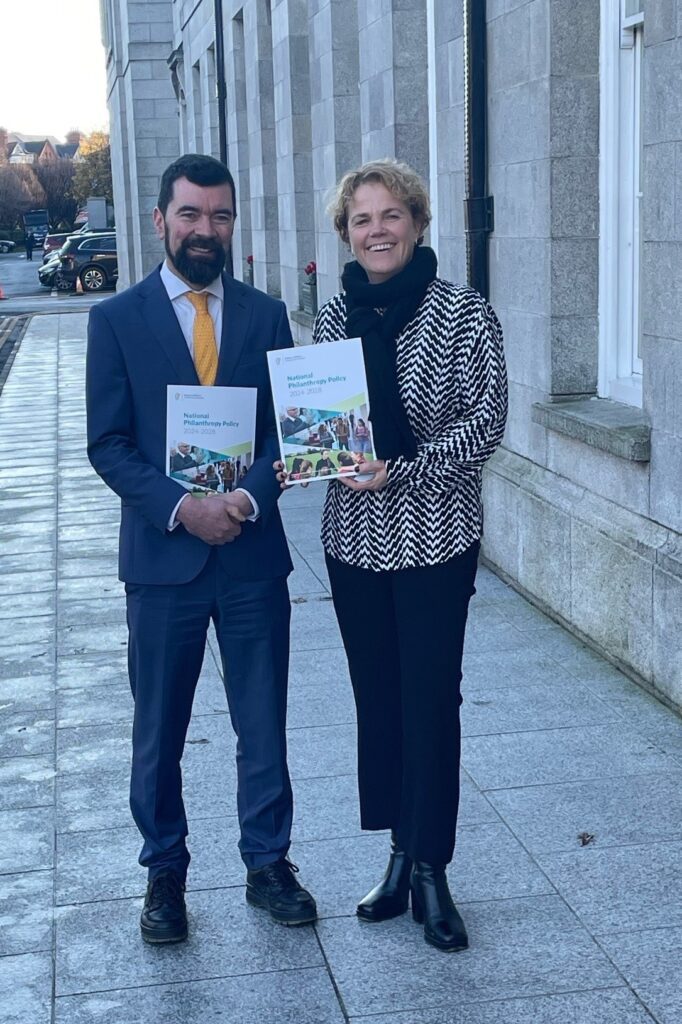By Denise Charlton
The first National Policy on Philanthropy might seem of little relevance to communities struggling with the every-day challenges of climate change, the rising cost of living and inequality. Yet within its pages are actions which if implemented could move our country to being a much fairer place for everyone.
Our reputation as a generous people is beyond question. Whether helping neighbours through hard times or giving food, clothing and shelter to strangers on the other side of the globe we as a people not only respond, but we dig deep.
This ability to open our hearts has earned us much acclaim, but there is one form of giving where we have lagged behind when compared to Britain, Europe or countries such as the United States. It is that larger form of more strategic long-term giving which characterises philanthropy.
The delivery of the long-promised policy has brought us to a moment where we can grow and support this form of giving and allow others to follow the exceptional contribution of trailblazers like the late Chuck Feeney to Irish life.

Increasing awareness is a major challenge facing a sector which has not reached its full potential. Setting out the most basic definition of philanthropy is always a good starting point. It is private giving for greater good.
At Community Foundation Ireland this is at the centre of everything we do. As a philanthropic hub with a mission of Equality for All in Thriving Communities we see every day the difference strategic giving can make.
It not only allows communities to respond to people and families with immediate need, but also achieves longer term policy change and even facilities solutions to long-standing issues.
It delivers services, projects and campaigns which otherwise would not happen. It is there as a partner when other funders are not. The activities supported can and do range from developing local biodiversity action plans, supporting community food banks, empowering the very young and the very old or standing up for the rights of those who are ignored or brushed aside.
The motivation of those who give is a question which is often raised. It often comes from a sense of place where a person or family have a connectivity to village, town, city or county.
We have seen that with the success of the recent Cork Arts Fund, the opening of the first Domestic Violence Refuge in West Cork or the provision of a tenant’s rights office in Limerick – all made possible by anonymous donors who wanted to make a difference locally.
Others want to help end the constant firefighting on a cause or issue. Such motivation has seen donors step up to support agenda setting child poverty research from the ESRI, ground-breaking findings on sexual violence by experts at the Sexual Exploitation Research Programme (SERP) or the first ever survey and campaigns on consent.
Against that backdrop there are positives we can draw from the new policy. While some actions will require consideration others can become reality much faster.
There is recognition of that sense of place as being a motivator for giving.
We believe that the groundwork is being laid for pilot funds to be established within local authority areas under which public and private money can work together to deliver equality.
One area for potential growth which has been identified is legacy giving. The policy acknowledges our ‘Legacies for Good’ research this summer which estimates that an extra €160M could be generated for communities if we reached the level of legacy giving seen in the UK. An early awareness campaign would set us on the road to achieve that goal.
There are complex issues where match-funding between Government and Philanthropy makes sense. This often includes responding to causes or needs which are hidden or away from the public gaze. The policy commits to a new cross-Government open-ness to such an approach.
Other jurisdictions use specially designated periods of the year to highlight the power of philanthropy, led by key spokespeople or advocates. Implementing an Irish Philanthropy Week would go a long way to raise awareness and encourage others to play their part.
We all know that well-meaning policies alone are not enough to address the many problems facing our society. Minister of State, Joe O’Brien TD and his officials are to be congratulated for a policy with substance. In the New Year the commitments will need to become reality in order to ensure momentum is maintained. The formulation of an implementation strategy or timeline will be key.
For now, we can say with some confidence that the moment to grow and promote Irish philanthropy has arrived, but it is only if it is seized that the benefits truly will be for everyone.
Denise Charlton is Chief Executive of Community Foundation Ireland which since the year 2000 has provided over €130M in grants to over 5,000 voluntary, community and charitable groups.